九年级unit 2 知识点总结+3a填空+练习
- 格式:docx
- 大小:21.73 KB
- 文档页数:4
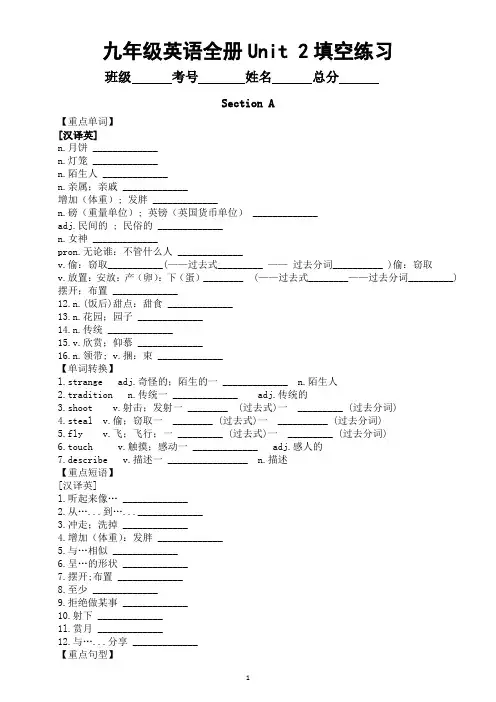
九年级英语全册Unit 2填空练习班级考号姓名总分Section A【重点单词】[汉译英]n.月饼 _____________n.灯笼 _____________n.陌生人 _____________n.亲属;亲戚 _____________增加(体重); 发胖 _____________n.磅(重量单位); 英镑(英国货币单位) _____________adj.民间的 ; 民俗的 _____________n.女神 _____________pron.无论谁:不管什么人 _____________v.偷:窃取___________(——过去式_________ ——过去分词__________ )偷:窃取v.放置:安放:产(卵):下(蛋)________ (——过去式________——过去分词_________) 摆开;布置 _____________12.n.(饭后)甜点:甜食 _____________13.n.花园;园子 _____________14.n.传统 _____________15.v.欣赏;仰慕 _____________16.n.领带; v.捆:束 _____________【单词转换】l.strange adj.奇怪的;陌生的一 _____________ n.陌生人2.tradition n.传统一 _____________ adj.传统的3.shoot v.射击;发射一 ________ (过去式)一 _________ (过去分词)4.steal v.偷;窃取一 ________ (过去式)一 __________ (过去分词)5.fly v.飞;飞行;一 _________ (过去式)一 _________ (过去分词)6.touch v.触摸;感动一 _____________ adj.感人的7.describe v.描述一 ________________ n.描述【重点短语】[汉译英]l.听起来像… _____________2.从…...到…..._____________3.冲走;洗掉 _____________4.增加(体重):发胖 _____________5.与…相似 _____________6.呈…的形状 _____________7.摆开;布置 _____________8.至少 _____________9.拒绝做某事 _____________10.射下 _____________1l.赏月 _____________12.与…...分享 _____________【重点句型】1.__________ a great day!多么好的一天啊!2.Bill wonders _____________ they'll have zongzi again next year.比尔想知道他们明年是否将再吃粽子。
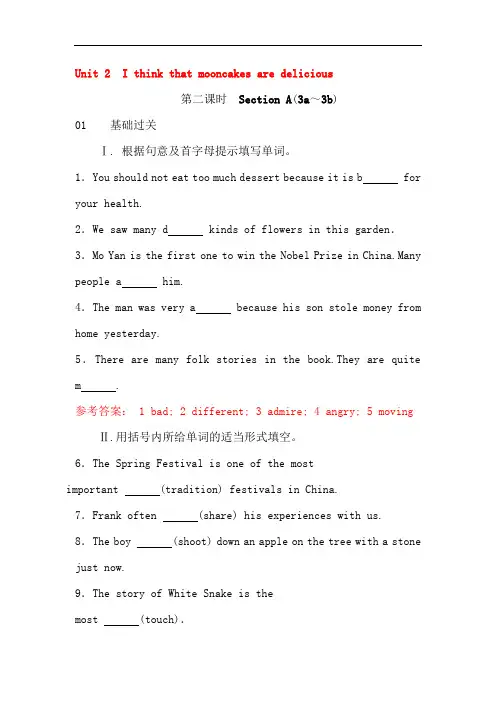
Unit 2 I think that mooncakes are delicious第二课时Section A(3a~3b)01 基础过关Ⅰ.根据句意及首字母提示填写单词。
1.You should not eat too much dessert because it is b for your health.2.We saw many d kinds of flowers in this garden.3.Mo Yan is the first one to win the Nobel Prize in China.Many people a him.4.The man was very a because his son stole money from home yesterday.5.There are many folk stories in the book.They are quite m .参考答案: 1 bad; 2 different; 3 admire; 4 angry; 5 moving Ⅱ.用括号内所给单词的适当形式填空。
6.The Spring Festival is one of the mostimportant (tradition) festivals in China.7.Frank often (share) his experiences with us. 8.The boy (shoot) down an apple on the tree with a stone just now.9.The story of White Snake is themost (touch).10. (who) leaves the room last should turn off the lights.参考答案:6 traditional; 7 shares; 8 shot; 9 touching; 10 WhoeverⅢ.根据汉语提示完成句子,每空一词。
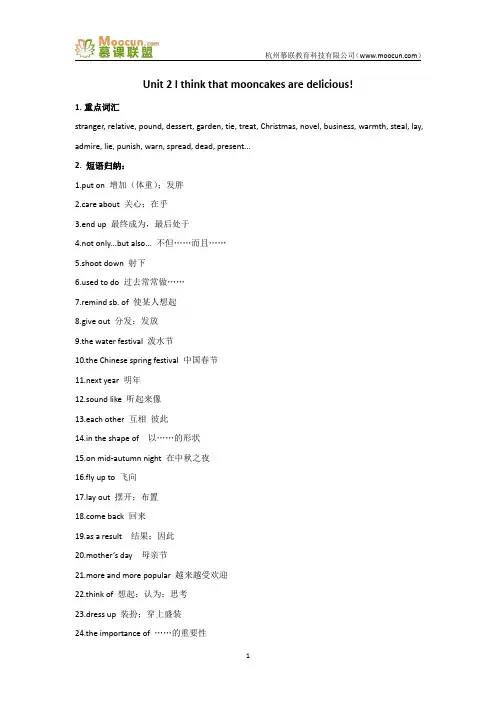
Unit 2 I think that mooncakes are delicious!1.重点词汇stranger, relative, pound, dessert, garden, tie, treat, Christmas, novel, business, warmth, steal, lay, admire, lie, punish, warn, spread, dead, present...2. 短语归纳:1.put on 增加(体重);发胖2.care about 关心;在乎3.end up 最终成为,最后处于4.not only...but also... 不但……而且……5.shoot down 射下ed to do 过去常常做……7.remind sb. of 使某人想起8.give out 分发;发放9.the water festival 泼水节10.the Chinese spring festival 中国春节11.next year 明年12.sound like 听起来像13.each other 互相彼此14.in the shape of 以……的形状15.on mid-autumn night 在中秋之夜16.fly up to 飞向y out 摆开;布置e back 回来19.as a result 结果;因此20.mother’s day 母亲节21.more and more popular 越来越受欢迎22.think of 想起;认为;思考23.dress up 装扮;穿上盛装24.the importance of ……的重要性3. 必背典句:1. I know that the Water Festival is really fun. 我知道泼水节真的很有趣。
2. I wonder if they’ll have the races again next year. 我想知道他们明年是否还会有比赛。
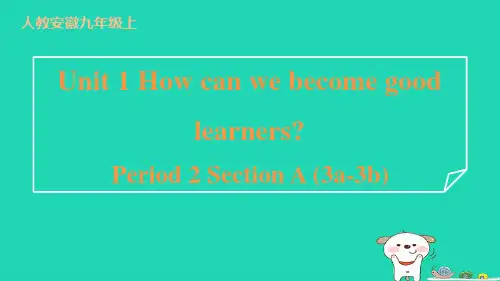
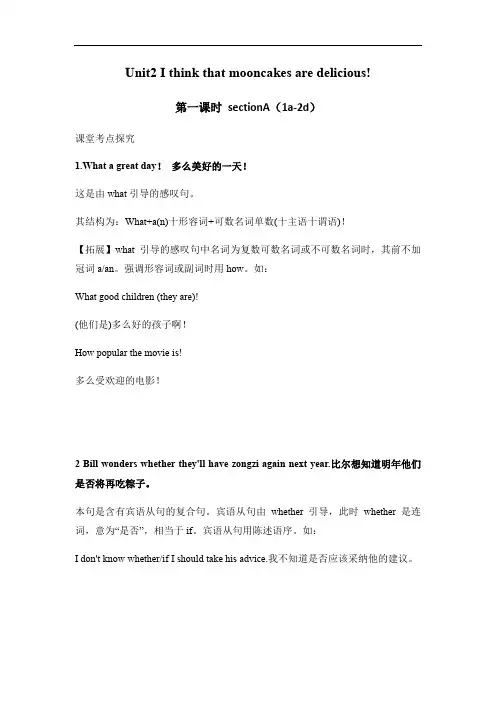
Unit2 I think that mooncakes are delicious!第一课时sectionA(1a-2d)课堂考点探究1.What a great day!多么美好的一天!这是由what引导的感叹句。
其结构为:What+a(n)十形容词+可数名词单数(十主语十谓语)!【拓展】what引导的感叹句中名词为复数可数名词或不可数名词时,其前不加冠词a/an。
强调形容词或副词时用how。
如:What good children (they are)!(他们是)多么好的孩子啊!How popular the movie is!多么受欢迎的电影!2 Bill wonders whether they'll have zongzi again next year.比尔想知道明年他们是否将再吃粽子。
本句是含有宾语从句的复合句。
宾语从句由whether 引导,此时whether 是连词,意为“是否”,相当于if。
宾语从句用陈述语序。
如:I don't know whether/if I should take his advice.我不知道是否应该采纳他的建议。
3.put on 的用法put on意为“增加(体重);发胖”。
如:He has put on weight duringthe last two months.他过去两个月里体重增加了。
【拓展】put on 还有“穿上;戴上;上演;举办”等意思。
4 pound n.磅:英镑当可数名词pound 表示重量单位时,意为“磅”;表示货币单位时,意为“英镑”,其符号是£。
5.I'm going to Chiang Mai in two weeks.我打算两周后去清迈。
in two weeks 意为“两周以后”“in十一段时间”表示“在多长时间以后”,常用于一般将来时的句子中,对它提问用how soon。
如:—How soon will you be back?你们还有多久回来?—We will be back in an hour.我们会在一个小时后回来。
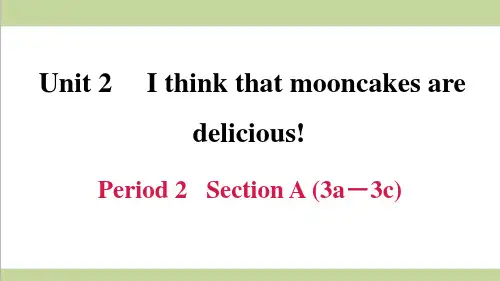
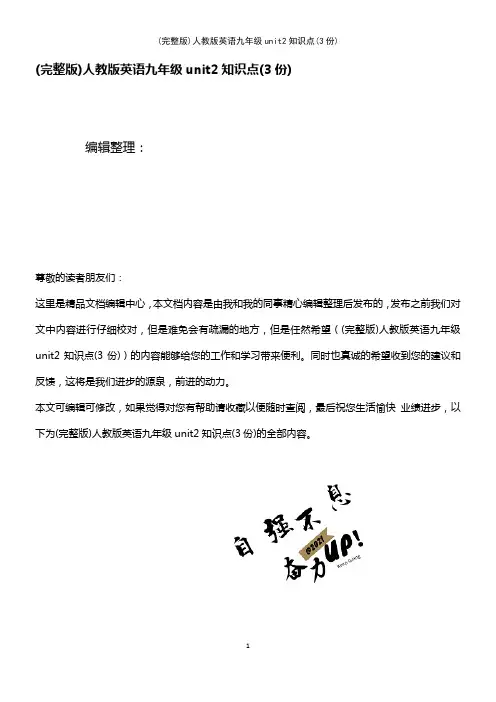
(完整版)人教版英语九年级unit2知识点(3份)编辑整理:尊敬的读者朋友们:这里是精品文档编辑中心,本文档内容是由我和我的同事精心编辑整理后发布的,发布之前我们对文中内容进行仔细校对,但是难免会有疏漏的地方,但是任然希望((完整版)人教版英语九年级unit2知识点(3份))的内容能够给您的工作和学习带来便利。
同时也真诚的希望收到您的建议和反馈,这将是我们进步的源泉,前进的动力。
本文可编辑可修改,如果觉得对您有帮助请收藏以便随时查阅,最后祝您生活愉快业绩进步,以下为(完整版)人教版英语九年级unit2知识点(3份)的全部内容。
(完整版)人教版英语九年级unit2知识点(3份)编辑整理:张嬗雒老师尊敬的读者朋友们:这里是精品文档编辑中心,本文档内容是由我和我的同事精心编辑整理后发布到文库,发布之前我们对文中内容进行仔细校对,但是难免会有疏漏的地方,但是我们任然希望 (完整版)人教版英语九年级unit2知识点(3份)这篇文档能够给您的工作和学习带来便利.同时我们也真诚的希望收到您的建议和反馈到下面的留言区,这将是我们进步的源泉,前进的动力。
本文可编辑可修改,如果觉得对您有帮助请下载收藏以便随时查阅,最后祝您生活愉快业绩进步,以下为〈(完整版)人教版英语九年级unit2知识点(3份)> 这篇文档的全部内容。
Unit 2 I think that mooncakes are delicious!知识点及重难点语法汇总Language points and summary1. stranger n. 陌生人(可数名词)strange adj. 陌生的,奇怪的e。
g. Don't talk to strangers. 不要和陌生人说话。
There is nothing strange in the room。
房间里没有奇怪的东西.2. relative n. 亲属,亲戚(可数名词)e。
g。
They have a lot of relatives。
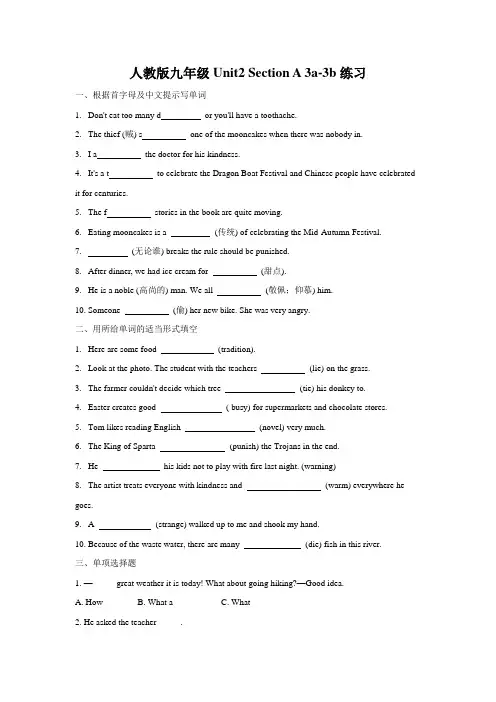
人教版九年级Unit2 Section A 3a-3b练习一、根据首字母及中文提示写单词1.2.3.4.it for centuries.5.6.7.8.9.10.二、用所给单词的适当形式填空1.2.3.4.5.6.7.8.goes.9.10.三、单项选择题1. —_____ great weather it is today! What about going hiking?—Good idea.A. HowB. What aC. What2. He asked the teacher _____.A. how can he improve his EnglishB. if he passed the examC. where are they going camping next week3. —Do you know the last Beidou satellite was launched (发射) successfully yesterday?—_____ good news! All the people are proud of the achievements China has made.A. WhatB. What aC. How4. He asked me _____.A. if I would go skating with himB. when did I buy the CDC. that I had a good time5. _____ fun the Water Festival is!A. WhatB. How aC. How6. Do you know _____ Lin Tao's father will come to school tomorrow?A. whichB. ifC. who7. _____ fine weather it is!A. What aB. HowC. What8. I wonder _____ the Mother's Day is on the second Sunday of May.A. thatB. ifC. how9. —We are going to take part in Running Man. —_____ exciting news!A. WhatB. What anC. How10. —Excuse me, I wonder _____ in the neighborhood.—Yes, there is a 7-Eleven on Center Street.A. where we can find a supermarketB. if there is a supermarketC. how we can get to a supermarket四、语法填空There are many folk stories about the Mid-Autumn Festival. However, I think the story of Chang'e is ___1__(touching) of all. Chang'e was Hou Yi's wife. Hou Yi __2___ (shoot) down nine suns and saved the people on the earth. A goddess gave Hou Yi magic medicine to thank him. __3___ (who) drank it could live forever. Hou Yi planned to drink it with his wife. One day, Chang'e was at home alone. A bad man, Pang Meng, wondered ___4__he could steal the medicine from her. Chang'e refused __5___ (give) the medicine to Pang Meng and drank it __6___ (her). __7___ aresult, Chang'e became light and flew to the moon. Hou Yi was so sad. He watched the moon every night and wished his wife could come back. One night, he found ___8__ the moon was so bright and round that he could see his wife there. He immediately __9__ (lay) out her favorite desserts and fruits in the garden.After this, people started the __10__ (traditional) of admiring the moon and sharing moon cakes with their families.五、英汉互译1. Chinese people have been celebrating Mid-Autumn Festival and enjoying mooncakes for centuries._______________________________________________________________________________ 2. They carry people’s wishes to the families they love and miss._______________________________________________________________________________ 3. 无论谁喝了这个都能长生不老,后羿打算和嫦娥一起喝_______________________________________________________________________________ 4. 后羿悲痛不已,以至于每晚都对着月亮大声喊着她的名字。
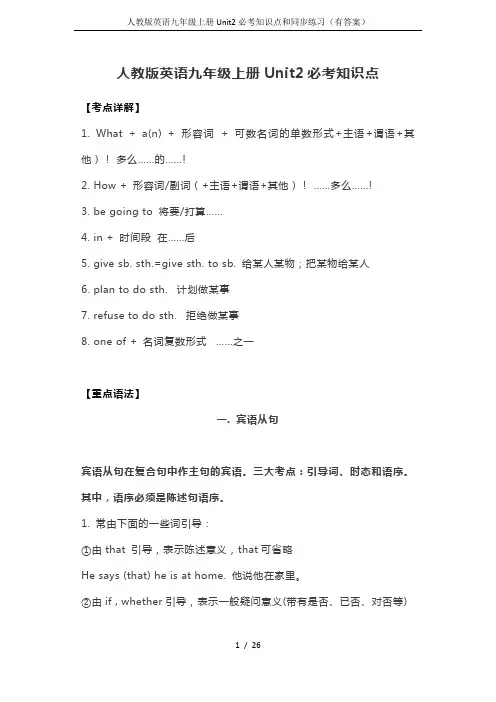
人教版英语九年级上册Unit2必考知识点【考点详解】1. What + a(n) + 形容词+ 可数名词的单数形式+主语+谓语+其他)!多么……的……!2. How + 形容词/副词(+主语+谓语+其他)!……多么……!3. be going to 将要/打算……4. in + 时间段在……后5. give sb. sth.=give sth. to sb. 给某人某物;把某物给某人6. plan to do sth. 计划做某事7. refuse to do sth. 拒绝做某事8. one of + 名词复数形式……之一【重点语法】一. 宾语从句宾语从句在复合句中作主句的宾语。
三大考点:引导词、时态和语序。
其中,语序必须是陈述句语序。
1. 常由下面的一些词引导:①由that 引导,表示陈述意义,that可省略He says (that) he is at home. 他说他在家里。
②由if , whether引导,表示一般疑问意义(带有是否、已否、对否等)I don’t know if / whether Wei Hua likes fish. 我不知道韦华是否喜欢鱼。
③由连接代词、连接副词(疑问词) 引导,表示特殊疑问意义Do you know what he wants to buy? 你知道他想要买什么吗?2. 从句时态要与主句一致当主句是一般现在时,从句根据情况使用任何时态当主句是一般过去时,从句应使用过去某时态(一般过去时,过去进行时,过去将来时,过去完成时)He said (that) he was at home. 他说他在家里。
I didn’t know that she was singing now. 我不知道她正在唱歌。
She wanted to know if I had finished m homework. 她想要知道我是否已经完成了我的作业。
Did you know when he would be back? 你知道他将会什么时候回来?二. 感叹句感叹句是表达喜、怒、哀、乐以及惊奇、惊讶等强烈感情的句子。
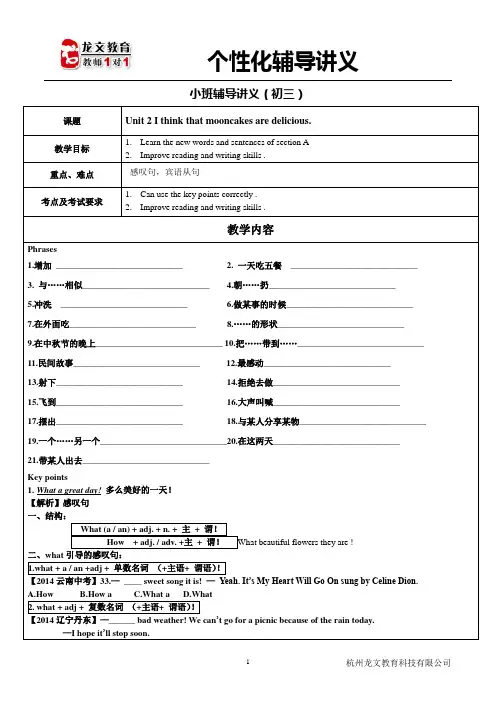
小班辅导讲义(初三)课题Unit 2 I think that mooncakes are delicious.教学目标1.Learn the new words and sentences of section A2.Improve reading and writing skills .重点、难点感叹句,宾语从句考点及考试要求1.Can use the key points correctly .2.Improve reading and writing skills .教学内容Phrases1.增加_____________________________2. 一天吃五餐_____________________________3. 与……相似_____________________________4.朝……扔_____________________________5.冲洗_____________________________6.做某事的时候_____________________________7.在外面吃_____________________________8.……的形状_____________________________9.在中秋节的晚上_____________________________ 10.把……带到……_____________________________ 11.民间故事_____________________________ 12.最感动_____________________________13.射下_____________________________ 14.拒绝去做_____________________________15.飞到_____________________________ 16.大声叫喊_____________________________17.摆出_____________________________ 18.与某人分享某物_____________________________ 19.一个……另一个_____________________________20.在这两天_____________________________21.带某人出去_____________________________Key points1.What a great day!多么美好的一天!【解析】感叹句一、结构:What (a / an) + adj. + n. + 主+ 谓!How + adj. / adv. +主+ 谓!What beautiful flowers they are !二、what引导的感叹句:1.what + a / an +adj + 单数名词(+主语+ 谓语)!【2014云南中考】33.—____ sweet song it is! —Yeah. It’s My Heart Will Go On sung by Celine Dion.A.HowB.How aC.What aD.What2. what + adj + 复数名词(+主语+ 谓语)!【2014辽宁丹东】—______ bad weather! We can’t go for a picnic because of the rain today.—I hope it’ll stop soon.A. WhatB.HowC. What aD. How a3. what + adj + 不可数名词(+主语+ 谓语)!_______ bad weather !三、how引导的感叹句:1.How + adj / adv + 主语+ 谓语!【2014黑龙江龙东】24.-What can you see in the garden? -Flowers. ________ beautiful they are!A. WhatB. HowC. How a【2014南京中考】6. -- ____ brave Zhang Hua is! --Yes. He helped his neighbour, Mrs. Sun out of the fire.A. What aB. HowC. .How aD.What【2014山东滨州】27.—_________ interesting the film is! —Yes, I have seen it twice.A.WhatB.HowC. What anD. How an2.How + adj + a / an + 单数名词(+主语+ 谓语)!How tall a boy he is !3.How + adj / adv + the + 名词+ 谓语!_______ heavily the rain is falling!四、what 与how引导的感叹句之间的转换:1.What a beautiful girl she is != ______ beautiful the girl is !2.How delicious the food is != ______ delicious food it is !六、几个常见的感叹句1.______ great fun it is !2.______ important information !3.______ good news !【感叹句练习】()①. beautiful hat she is wearing! A. What B. What a C. How D. How a ()②. kind the old man! A. What B. What a C. How a D. How()③. unusual day ! A. What a B. What C. What an D. How【中考真题演练】【2013黔西南】1. —_____________beautiful skirt ! —Thank you .A. WhatB. What aC. HowD. How a【2013云南】2. ________ exciting sport it is to go bike riding!A. What aB. What anC. WhatD. How【2013黄石】3. ______ fun it is to have ice cream in hot summer!A. What aB. HowC. WhatD. How a【2013东营】4. Look at the smog (雾霾). _____ bad weather it is!A. HowB. How aC. WhatD. What a【2013河北】5. ______ great picture! Who painted it?A. HowB. WhatC. How aD. What a【2014福州】32—______ foggy day! —Something must be done to solve the haze problem.A.HowB.WhatC.What a2.The Dragon Boat Festival in Hong Kong 香港龙舟节【解析】介词in表地点in用于较大的地点前,如大城市、国家、洲等。
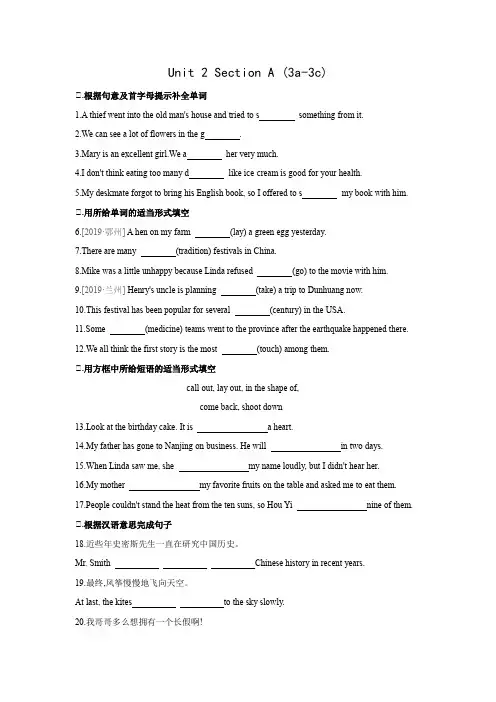
Unit 2 Section A (3a-3c)Ⅰ.根据句意及首字母提示补全单词1.A thief went into the old man's house and tried to s something from it.2.We can see a lot of flowers in the g.3.Mary is an excellent girl.We a her very much.4.I don't think eating too many d like ice-cream is good for your health.5.My deskmate forgot to bring his English book, so I offered to s my book with him.Ⅰ.用所给单词的适当形式填空6.[2019·鄂州] A hen on my farm (lay) a green egg yesterday.7.There are many (tradition) festivals in China.8.Mike was a little unhappy because Linda refused (go) to the movie with him.9.[2019·兰州] Henry's uncle is planning (take) a trip to Dunhuang now.10.This festival has been popular for several (century) in the USA.11.Some (medicine) teams went to the province after the earthquake happened there.12.We all think the first story is the most (touch) among them.Ⅰ.用方框中所给短语的适当形式填空call out, lay out, in the shape of,come back, shoot down13.Look at the birthday cake. It is a heart.14.My father has gone to Nanjing on business. He will in two days.15.When Linda saw me, she my name loudly, but I didn't hear her.16.My mother my favorite fruits on the table and asked me to eat them.17.People couldn't stand the heat from the ten suns, so Hou Yi nine of them.Ⅰ.根据汉语意思完成句子18.近些年史密斯先生一直在研究中国历史。
朝阳学校九年级英语学案教师:学生:日期:科目:英语时段:课题Unit 2 I used to be afraid of dark.学习目标考点分析1、学会陈述自己过去常做的事情2、能够表达自己现在和过去在外表、性格、娱乐等方面的变化学习重点重点:学会陈述自己过去常做的事情难点:学会陈述自己过去常做的事情学习方法分析、对比、归纳总结和练习相结合学习内容与过程【语言点】ed to句型的用法:结构:“主语+used to+动词原形+其它”。
used to的含义为“过去常常”。
表示过去的习惯,暗示现在已无此习惯。
这个词组只用于讲述过去,我们不能用use to来讲述现在。
否定形式:didn’t use to…. (否定也用usedn’t,是较老的英国英语的用法,现在用得很少。
)问句形式:Did you use to…?例如:Dave used to work in a factory. (肯定句)(隐含的意思是:Dave worked in a factory before but he doesn’t work there now.)The shop didn't use to (usedn't to) open on Sundays. 这家商店过去星期日不营业。
(否定句)对过去事情的描述:外貌描述:used to +be + adj ( short, tall, medium height, slim, bald等)used to have + (long hair, short hair, curly hair, blond hair等)性格描述:used to + be + adj ( generous, wild, quiet, intelligent等)习惯爱好:be used to + do sth ( get up early, eat junk food等)2.词语辨析:used to do、be used to doing 、be used to do 和be used for sth./doing .①used to do “过去常常做某事”②be / get used to doing / sth.是“习惯于做某事”,后面接名词或动名词,可用于现在、过去、将来的多种时态。
人教版九年级全一册Unit 2 Section A 单词、短语、知识点默写及短文填空一、单词1.月饼2.灯笼3.陌生人4.陌生的;奇怪的5.亲属;亲戚6.磅;英镑7.民间的;民俗的8.女神9.无论谁;不管什么人10.偷;窃过去式过去分词11.放置;安放;产卵;下蛋过去式过去分词12.甜点;甜食13.花园;园子14.传统15.传统的16.欣赏;仰慕17.领带/捆/束18.n.幸运;运气adj.幸运的adv. 幸运地adj. 不幸的adv. 不幸地19.感人的比较级最高级v.感动;触摸20.传统传统的二、短语及知识点1.中国春节2.有点太拥挤了3.外出就餐;出去吃饭4.在六月5.发胖;增加体重;穿上6.两周后(将来)7.听起来像+ 8.一年中最热的月份9.从....到...... 10.与....相像的;类似的11.相互泼水12.做某事的时间13.冲走;洗掉14.回答问题15.庆祝中秋节16.呈.....形状17.在中秋之夜18.射下;击落19.给某人某物;把某物给某人=20.吃药21.计划;打算做某事22.拒绝做某事23.飞(上)向24.如此...以至于... 25.大声呼喊26.打电话给;征召27.摆开;布置28.某人最喜欢的29.在花园里30.回来31.......的传统32.赏月33.和......分享/分担34.结果35.越来越流行36.有(将来时)37.事实上;实际上38.一个.....另一个....39.感叹句构成三、语法1.that引导的宾语从句(宾语从句是,用that引导)我认为七月是北京最热的月份。
老师说我是正确的。
2.if/whether引导的宾语从句(宾语从句是或,用if/whether引导)我想知道六月是不是游览香港的好时候以下几种情况只能用whether(1)当or not 直接跟在关联词后时,只能用whether。
I don’t know whether or not they will come.(2)在动词不定式之前只能用whether。
新人教版英语九年级第二单元知识点讲解及练习一、重点单词stranger n. 陌生人 steal v. ;窃取lay v. 放置;安放;〔卵〕;下〔蛋〕dessert n〔后〕甜点;甜食garden n. 花园;园子admire v. 欣;仰慕 tie n. v. 捆;束trick n. 花招;把treat n. 款待;招待 v. 招待;〔客〕lie v. 平躺;于 dead adj. 死的;失去生命的business n. 生意;商punish v. ;warn v. 警告;告 nobody pron. 没有人warmth n. 温暖;暖和spread v. 播;展开 n. 蔓延; present n. 在;礼物 adj. 在的relative n. 属;戚二、重点短put on 增加〔体重〕;胖in two weeks 两星期之后be similar to... 与.......相似plan to do... 打算做 ...lay out 开 ;布置 end up 最成 ;最后于share sth. with sb. 与⋯⋯分享⋯⋯ as a result果one,. . the other... ( 两者中的 )一个⋯⋯另一个⋯⋯ dress up 装打扮play a trick on sb. 捉弄某人 give out 分care about ..⋯关心 warn sb. to do sth. 警告某人做某事remind....o f... 使。
回想起 promise to do sth. 承做某事like best 最喜used to do sth 去常常做某事in need 在困中so...that... 如此 ..以致于 ... between....and... 在...和 ..之not only...but (also).. 不但 ...而且 ...三、元重点、点精1. lie vi. 平躺;位于lay - lain - lyingIf you feel unwell, go and lie down. 如果你感到不舒服 ,就去躺下。
Unit 2 I think that mooncakes are delicious! 重点词汇1.warm __________ (n.)2.tradition __________ (adj.)3.fly __________ (过去时)4.shoot __________ (过去时)5.mean __________ (n.)6.strange __________ (n.)7.steal ________过去时______过去分词)y _______(过去时) ______(过去分词)9.lie __________ (现在分词)10.busy __________ (n.)11.dead __________ (v.) __________ (n.)12.s trange(adj. ) →__________(n. )陌生人13. steal(v. )→____________(过去式)→____________(过去分词)14. lay(v.)→_______(过去式)____过去分词)15. warm(adj. )→__________(n.温暖; 暖和Key Words and Expressions(英汉互译)1. 月饼(n. ) ___________________2. 灯笼(n. ) ____________________3. 民间的; 民俗的(adj. ) ____________________4. 花园; 园子(n. ) __________________5. 欣赏; 仰慕(v. ) ____________________6. 鬼; 鬼魂(n. ) ____________________7. 美味的____________________ 8. 生意; 商业(n. ) ____________________9. 处罚; 惩罚(v. ) ____________________ 10. 警告; 告诫(v. ) ____________________ 11.传播; 展开; 蔓延(v. &n. ) _________________ 12. 传统(n. ) ________________ 13. in the shape of. . . ____________________ 14. 甜点; 甜食(n. ___________________ 15.无论谁; 不管什么人(pron. ) __________________ 16. haunted(adj. )________________ 17. ghost(n. ) __________________ 18. spider(n. )__________________19. 花招; 把戏(n. )__________________ 20. 款待; 招待(v. &n. ) __________________ 21. novel(n. )__________________ 22. business(n. ) __________________23. punish(v. )__________________ 24. 警告; 告诫(v. )__________________25. relative(n. ) _________________26. Water Festival ___________________27. Spring Festival ____________________ 28.Boat Festival___________________29. Lantern Festival _________________ 30. in the shape of ___________________31. care about ____________________ 32.remind of___________________33.in need _____________________ 34. 增加(体重); 发胖____________________35. 与……相似____________________ 36. 摆开; 布置____________________37. 打扮; 装扮; 穿上盛装____________________ 38. 最喜欢____________________ 39.捉弄某人; ____________________ 40.最终成为; 最后处于____________________ 41.明年____________________ 42.去…度假____________________43. 听起来像____________________ 44. play a trick on sb. ____________________ 45. shoot down ____________________ 46. as a result ____________________ 47. 飞起; 向上飞____________________ 48. 摆开; 布置____________________ 49. 回来; 返回____________________ 50. care about ____________________ 51. end up ____________________ 52. in need ____________________53. 使记起; 使回想起____________________ 54. 醒; 醒来____________________ 55. look scary ____________________ 56. light candles ____________________ 57. dress up as____________________ 58. play a trick on sb. ____________________重点句型1.比尔想知道他们明年是否会再吃到粽子。
Bill __________ __________they will have zongzi again next year.2.我知道泼水节确实很有趣。
I know __________ the Water Festival __________ really fun.3.今天是多棒的一天!__________ __________ great day it is!4.我听说在中国庆祝母亲节和父亲节正变得越来越流行。
I heard that it is becoming __________ __________ __________ popular __________ __________ Mother’s Day and Father’s Day in China.5.香港的食物真可口!__________ __________ the food is in Hong Kong!6.我不知道吉姆是否会来这儿。
如果他来,我会给你打电话。
I don’t know if Jim __________ __________ here. If he __________, I __________ __________ you up.用所给单词的适当形式填空1. Have you read the novel __________ (write) by J.K. Rowling?2. If you don’t study hard, you will end up __________ (fail) the exams.3. We’d like to enjoy the __________ (warm) of the house.4. The girl promises __________ (study) hard from now on.5. His father went to Shanghai on __________ (busy).6. He feels sorry for his little __________ (die) dog.7. She is new here. She is a __________ (strange) to everyone.8. I found a boy __________ (lie) on the road when I passed by.句型转换,没空一词1.The movie is very interesting. (改为感叹句)__________ __________ interesting movie it is!2.Peter runs really fast. (改为感叹句)__________ __________ Peter runs!3.Can you go shopping with me this afternoon? I wonder. (合并为一句)I __________ __________ __________ __________ go shopping with me this afternoon.4.Miss Green will come to China in three weeks. (对划线部分提问)__________ __________ will Miss Green come to China?根据汉语意思完成句子1.上个月我胖了五磅。
I __________ __________ five pounds last month.2.如果你不努力学习,你的结果会和他一样。
If you don’t study hard, you’ll __________ __________ like him.3.我想知道它是否跟泼水节相似。
I wonder __________ it’s __________ __________ the Water Festival.4.小孩儿们都装扮成鬼怪或者黑色的猫。
Little kids __________ __________ __________ ghosts or black cats.5.不仅汤姆,而且露西也对运动感兴趣。
__________ __________ Tom __________ __________ Lucy __________ __________ __________ sports.3a填空Full moon, Full ___________(feel)__________ (china) people have been __________ (celebrate) the Mid-autumn Festival and __________ (enjoy) mooncakes for __________ (century). Mooncakes are in the shape of a __________ (fill) moon on the Mid-autumn night. Theycarry________(people) __________ (wish) to the families they love and miss.There are __________(much) __________(tradition) folk __________(story) about this festival. ___________(however), most people think that the story of Chang’e is the most __________(touch). Chang’e was Hou Yi’s beautiful wife. After Hou Yi __________(shoot) down the __________(ninth) suns, a __________(god) gave him magic medicine to thank him. __________(who) drank this could live forever, and Hou Yi __________(plan) to drink it with Chang’e .However, a bad man, Pang Meng, tried_________(steal) the medicine when Hou Yi __________(is) home. Chang’e ref used__________(give) it to him and drank it all. She became very light and _______ (fly0 up to the moon. Hou Yi was so sad that he called out _____(she) name to the moon every night. One night, he found that the moon was so bright and _______(around) that he could see his wife there. He __________(quick)_______(lay)out her favorite fruits and desserts in the garden. How he wished that Chang’e____________ (come) back!After this, people started the __________(traditional) of __________(admire) the moon and sharing mooncakes with their __________(family).范文假设你是李华,你的美国笔友Maria对中国的传统节日端午节很感兴趣,希望你给她写封信介绍端午节。